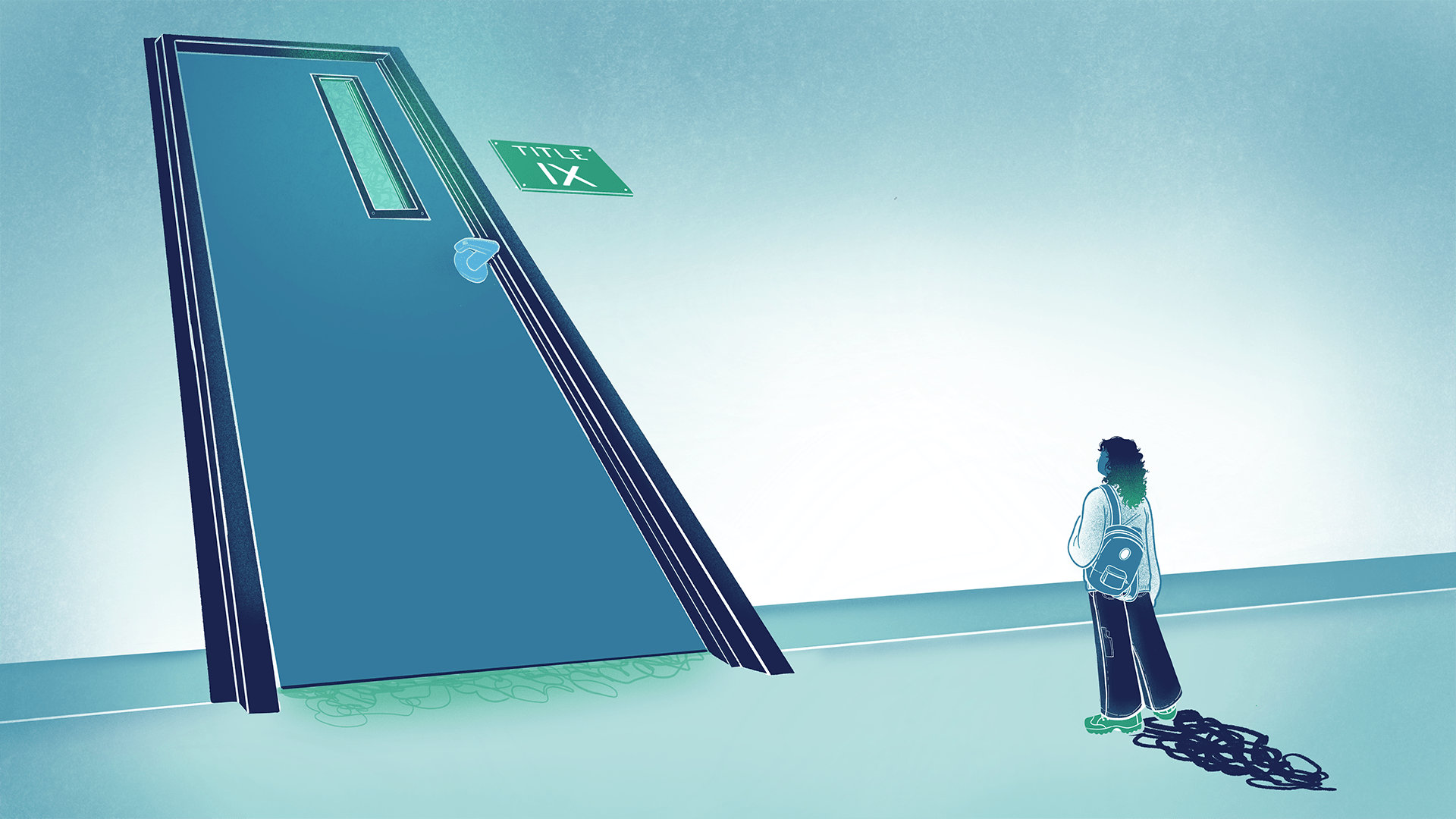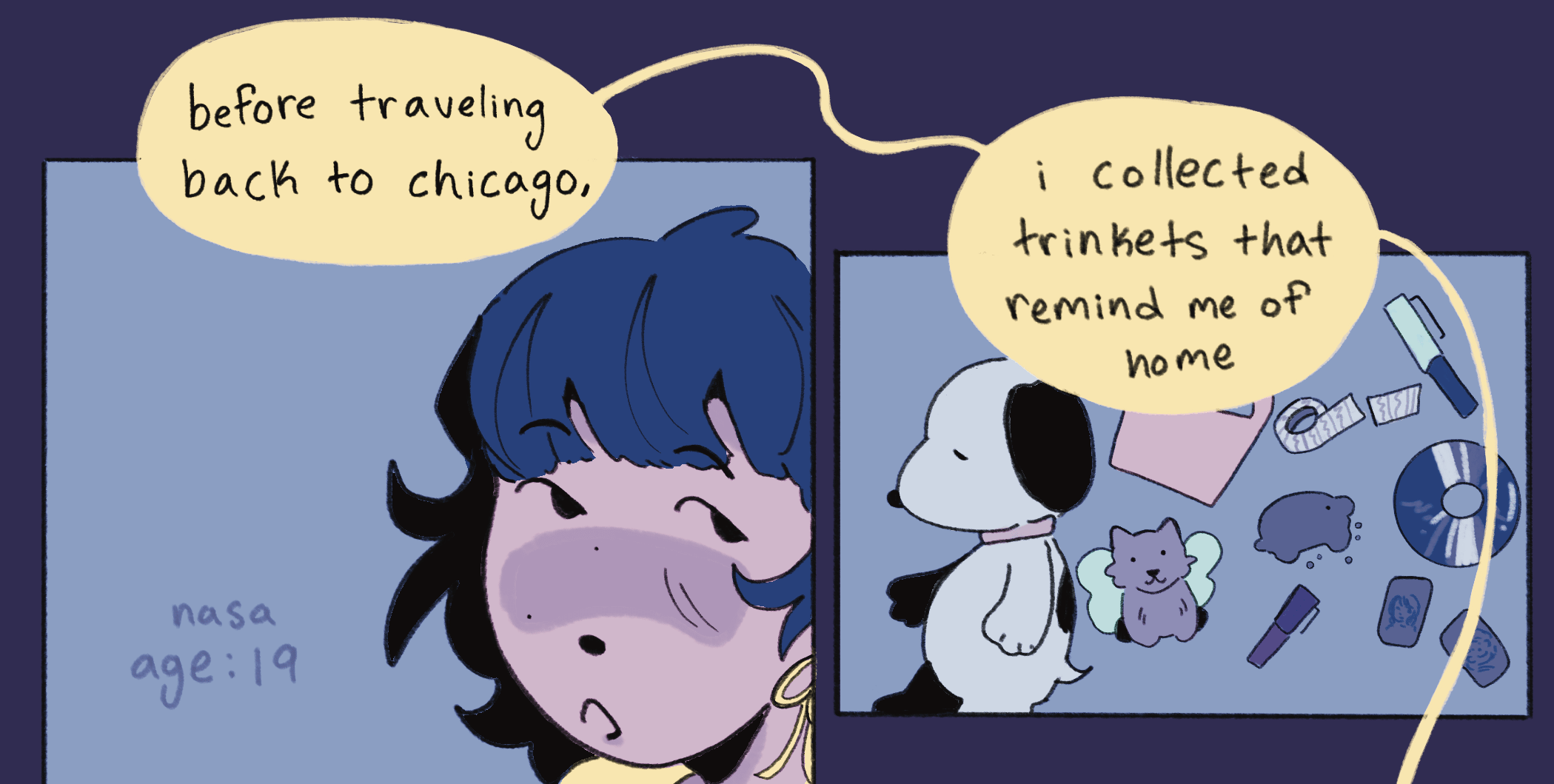
In a class offered in Spring 2020, international students were asked to raise their hands because the white teacher wanted to know how many non-native English speakers were in the room, said one of the students.
“She framed it differently as if we were very different. It was like separating people, almost alienating us. I hadn’t experienced that before,” said the student, who graduated in the spring of 2023 and was also a Resident Advisor for two years. (F Newsmagazine is not naming the former student to protect her privacy.)
The international student contacted the School of the Art Institute’s Title IX office to report the behavior, as she was deeply impacted by it. But the way the Title IX office responded and handled her inquiry left her even more disappointed, she said.
“My feelings were invalidated by them,” she said, adding that the whole experience was emotionally upsetting. “They just told me that this was not a racial misconduct, and that I had to apologize to the teacher instead.”
After the incident, she dropped the class. But it wasn’t the first or the last disappointing experience an SAIC student had with the school’s Title IX office.
Several students who spoke to F Newsmagazine expressed dissatisfaction with the way SAIC’s Title IX office handles cases of abuse and discrimination.
SAIC established the Title IX office in compliance with federal law passed as part of the Educational Amendments of 1972. Verron Fisher, the deputy director of SAIC’s Title IX office, said the office is “dedicated to addressing complaints of sex discrimination, harassment, and sexual misconduct, while promoting awareness and support for all members of the SAIC community.”
However, according to several former and current students, the Title IX office hasn’t been particularly helpful when they sought support in cases of sexual abuse, harassment, and discrimination.
For example, when a former SAIC student who spoke on the condition of anonymity was assaulted outside the Sharp Building in 2019, the Title IX office sent only one email after the incident. According to the student, who is a BFA 2022 graduate, in the email that was sent to her, the office outlined the 16 free counseling sessions. There was no further follow-up, the student said.
“It felt kind of like an obligation that the school felt to provide one resource and then be done with the issue. Whereas I’ve, you know, been living with that for many years now. And it’s not something that I ever felt could be talked about at school,” she said. “Follow up is something that’s incredibly important in sensitive cases involving abuse, assault, and stalking. I think having that follow up is because those issues provide long lasting complex trauma that isn’t going to be solved in one interaction or one email.”
Fisher said that her office promptly investigates the reports and offers support and resources to individuals involved in Title IX cases and also collaborates with various departments and offices within SAIC to ensure a coordinated response to Title IX issues.
“We work closely with Human Resources, Student Affairs, Counseling Services, and other relevant entities to provide a comprehensive support system,” Fisher said.
That wasn’t the experience for the former student who was assaulted in front of Sharp. Beyond that one email, she didn’t receive any support from Title IX.
The abuse affected her mental health and well-being so much that she said she felt unsafe walking around campus. When she had night classes and the Title IX office did not offer help, she had to personally write to all her professors about the incident and how it affected her, which she said felt like rehashing the old wound over and over again.
“I felt embarrassed and ashamed for repeatedly emailing my professors individually and saying that I was still dealing with the trauma of an incident that I felt should have been reported to them by Title IX and not me,” she said. “Why is my victimization my burden?”
Another student who graduated last spring also shared their experience of not receiving the support from the Title IX office they expected after they were assaulted.
“I went to them after I was assaulted in my freshman year. It was by someone not affiliated with the school, and I had deleted most of the evidence. They offered to help me file a police report, but since I had no evidence, I declined,” the former student said. “I was told to go to counseling at the school, but at that time appointments had to be booked two weeks in advance, and the earliest ones were while I was in class, so I gave up,” they said.
Mitch Abrams, PsyD, is a licensed sport, clinical, and forensic psychologist. He said that the least a university can do is offer mental health counseling immediately after a student is assaulted. If victims have to wait a long time after an assault, it can lead to “repeated victimization,” he said.
“Universities need to provide mental health services immediately. Because if survivors don’t receive treatment or mental health services in a timely manner, they may develop paranoia that leads them to not trust anyone, including the treatment providers who can help them,” said Abrams.
How does the Title IX office actually work at SAIC?
To understand how the Title IX office works at SAIC, it is important to know that the Department of Education dictates the process of filing cases, Fisher said in an email interview.
At SAIC, once a student reaches out to the Title IX office, Fisher said, they will be given guidance on how to proceed, which may include filing a formal complaint, seeking support services, or initiating a Title IX investigation, depending on the nature of the issue. “The Title IX staff member will guide the student through the necessary steps and provide information about any relevant deadlines or requirements,” she said.
On average, SAIC receives 85 to100 inquiries each academic year, Fisher said. But only a small percentage of those inquiries fall into a Title IX classification.
“And of those that are Title IX cases, most are resolved informally — at the request of the complainant — without going through a formal investigation process. All Title IX cases that are filed are resolved,” Fisher said.
According to Fisher, all Title IX staff members have undergone special training to handle sensitive situations. “To work in the Title IX office, individuals typically undergo comprehensive training that includes understanding the legal aspects of Title IX, recognizing signs of harassment and discrimination, conducting investigations, and supporting victim survivors or the parties involved. Title IX staff undergo comprehensive training on topics such as trauma-informed practices, cultural competency, confidentiality, investigation procedures, and providing support and resources to those affected by harassment or discrimination,” Fisher said.
In recent years, several Title IX cases at SAIC have come under the public spotlight.
The resignation of Michael Bonesteel, a former adjunct professor, in 2017 made national headlines as two Title IX complaints were filed against him for his behavior that some students found offensive. At the time, Bonesteel had his two classes reassigned, and the school mandated harassment and discrimination training as a condition for renewing his one-year contract. This led to Bonesteel’s resignation, and after he left the school, characterizing the student who filed the complaint against him as “a small cadre of militant LGBT students with an authoritarian agenda.
The next year, a former SAIC student sued the school, alleging that former faculty member John Phillips repeatedly abused her, affecting her psychological well-being. While the case has been settled, the School’s former Title IX coordinator was also a defendant in the case, as the student alleged that the school’s policies and procedures failed to properly investigate and/or address Phillips’ actions.
Is Title IX a broken system?
Title IX as we know it today was introduced in 1972 during the administration of former President Richard Nixon. Representative Patsy T. Mink authored and sponsored the bill, leading to its implementation among several academic institutions in the country, prohibiting sex discrimination. Over the years critics have raised their concerns about the limitations of Title IX. As it’s written, the rules are unable to address all discrimination and abuse that a student might encounter in educational spaces.
A 2022 USA Today investigation stated that the “Schools accused of violating Title IX – which bans sex discrimination across all aspects of education, including athletics and sexual harassment – have little to fear from the Office for Civil Rights; they can openly defy the agency, withhold records and fail to heed agreements with impunity.”
The article continues: “When it comes to cracking down on campus sexual misconduct, USA TODAY found, universities operate in a flawed system with inconsistent enforcement and little meaningful punishment.”
During the Trump administration, several changes were made into Title IX that critics argued made it more difficult for survivors to come forward. Title IX is currently being reviewed by the White House, as the Biden-Harris administration unveiled their plan in 2022 to codify it, making it more trans-friendly.
Several people, including students at SAIC, say the entire Title IX process should be survivor-friendly first and foremost. “I think a lot of the issue comes from making students who report incidents feel like they have to bear the burden of everything. It’s a lot of responsibility to shoulder when you’re filing a complaint. There comes a lot of blame and frustration with that,” said the student from the Sharp Building incident. “And I think that if administration or any counseling services could make it so that there was just more of a sense of trust and comfort that you as a reporter won’t be penalized and won’t be made a target, that could just do so much.”
What SAIC can do to make the school safer for students
In 2019, Jazmin Chapman, a former SAIC student from the Fiber and Material Studies department, filed a complaint at Title IX against a male student. Chapman said the student violated and preyed on her and spread rumors about them being in a sexual relationship. She wasn’t the only victim. She said the student named in the report had a history of abusing other women and taking advantage of them while under the influence of substances.
But the way the school handled the case left Chapman disheartened, as no serious action was taken against the student.
“He basically got off scot free; he got a slap on the wrist with an in-school suspension, which meant that I couldn’t be 30 feet near him and he couldn’t be 30 feet near me. Where the issue was with that is we lived in the same dorm, and we lived on the same floor. And they [housing] were not going to move him out,” Chapman said. “So at the end of the day, I just decided to move out because I wasn’t feeling safe. And I moved to the seventh floor. But I was still seeing him around school, which was very triggering for me.”
Chapman said it was unfair for her to live next door to someone whom she had a history of abuse with. Because she felt unsafe, she left the school altogether, transferring elsewhere.
“Although an in-school suspension is nice when you transfer schools or when you leave for the summer, it doesn’t protect you. Like, it’s literally a Band-aid to a bullet wound. And there definitely should have been more repercussions for what he had done,” Chapman said.
For many survivors, it’s difficult to share their stories and seek help as they fear for their safety. That’s why the colleges need to intervene and build strong resources that are readily available to students, Chapman said.
“Having more research resources for sure protecting people on campus and off campus is very much needed. And not just, ‘Oh, you get a safe ride back home,’” she added.
The student from the Sharp Building incident echoed the same sentiments, saying that the school needs to provide more resources to its students than it does now.
While students can utilize the school’s free 16-week counseling service and referrals recommended by the Title IX office, this student believes they should hire more experts with experience with student survivors. “I think more counselors would be ideal — especially counselors that are trained specifically in areas of sexual assault, and other forms of abuse. Because the SAIC counselors deal primarily with mental health-related issues and school-related stress. I don’t believe they have a specialist for sexual assault. I think that would be a great first step,” she said.
“There has to be more than just an email every April saying it’s Sexual Assault Prevention Month. I think there just has to be more follow through. Because it [sexual assault] isn’t happening this one month, and it’s not just happening to one student,” Chapman added.







